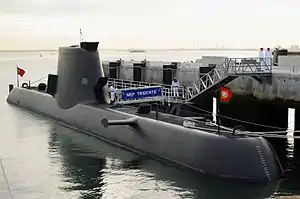Tridente-class submarine
The Tridente-class submarines, also designated as U 209PN, are diesel-electric submarines based on the Type 214 submarine developed by Howaldtswerke-Deutsche Werft GmbH (HDW) for the Portuguese Navy.
 Tridente-class profile | |
 NRP Tridente at the Lisbon Naval Base | |
| Class overview | |
|---|---|
| Builders: | HDW |
| Operators: |
|
| Preceded by: | Albacora class |
| Planned: | 3 |
| Completed: | 2 |
| Cancelled: | 1 |
| General characteristics | |
| Type: | Attack submarine |
| Displacement: |
|
| Length: | 67.7 m (222 ft) |
| Beam: | 6.35 m (21 ft) |
| Draught: | 6.6 m (22 ft) |
| Propulsion: | Diesel-electric, fuel cell AIP, low noise skew back propeller |
| Speed: |
|
| Range: | 12,000 nautical miles (22,000 km) at 8 knots (15 km/h) |
| Endurance: | 45 days |
| Test depth: | superior to 300 m (984 ft) |
| Capacity: | 14 |
| Complement: |
|
| Sensors and processing systems: |
|
| Armament: |
|
This class of submarines was acquired by Portugal to replace the previous submarines of the Albacora class, then being operated by the navy. Originally, HDW proposed the Type 209 submarine (U-209) during the competition, but decided to later enter a new proposal based on the Type 214. It is for this reason that the Tridente class is commonly designated as the U 209PN.
The class and its ships are the first to not be named after marine animals, thus breaking a tradition retracing back to 1913, when the first submarine entered service with the Portuguese Navy.
Ships
The Tridente-class submarines are wrongly classed in the "diesel-electric" class. Their propulsion is exclusively electric, with electric motors powered by batteries. These batteries may be charged while submerged by "fuel-cells" (inverse electrolysis) for which, this submarine carries a huge supply of liquid oxygen and hydrogen. Also, and solely as a second solution for recharging the batteries, this submarine carries two powerful diesel-electric generators (1.000 KVA) for use only when surfaced, or at snorkel depth .
Submerged, from Lisbon, Portugal, submarines of the class may reach the Cape of Good Hope and return, in 15 days.
| Pennant | Name | Laid down | Commissioned | Status |
|---|---|---|---|---|
| S160 | NRP Tridente | 2005 | May 2010 | In service |
| S161 | NRP Arpão | 2005 | December 2010 | In service |
Image gallery
 Tridente-class submarine in the Tejo River
Tridente-class submarine in the Tejo River
External links
| Wikimedia Commons has media related to Tridente class submarines. |
- Tridente class information at the Portuguese Navy website (in Portuguese)
- 209PN profile at the Portuguese Navy website (in Portuguese)
- Submarino de ataque (SSK) classe Tridente (tipo U-214) - Área Militar (in Portuguese)
- Acquisition history of the U-209PN class (in Portuguese)
- Article about the differences between the U209, U212, U214 and U209PN (in Portuguese)